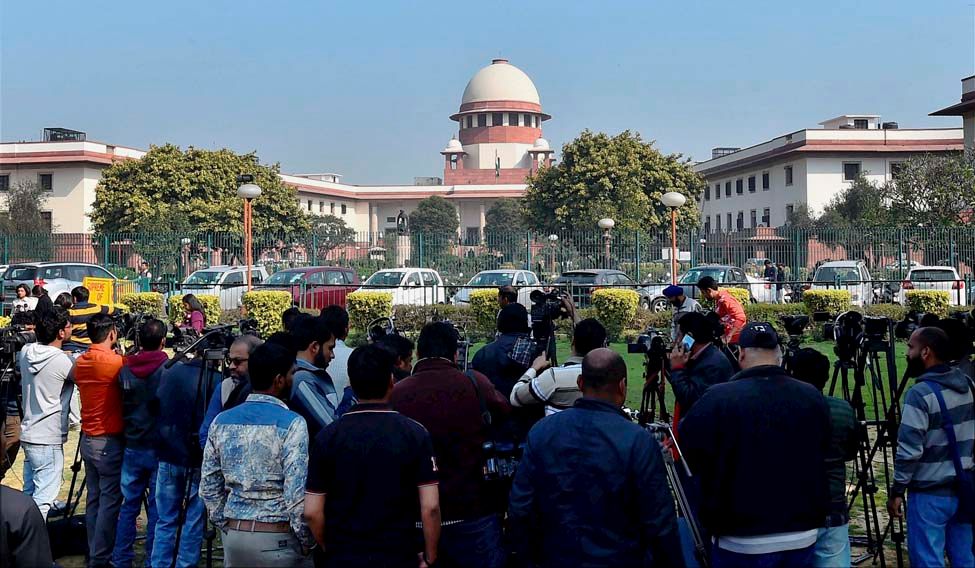A social activist from Bengaluru was slapped a fine of Rs 25 lakh by the Supreme Court on July 4 for “abuse” of public interest litigation (PIL). While the observations of the court have disheartened the rights' groups, it is also feared that the harsh penalty imposed on the litigant could dissuade all future litigants.
The apex court has been reiterating its stand of imposing “exemplary costs” on people filing frivolous petitions as they “choke” an already overburdened judicial system. However, the activists rue the absence of proper guidelines to determine what qualifies as a “genuine” PIL and the lack of clarity on who can or cannot file a PIL.
T.J. Abraham, an anti-corruption activist, who has filed several PILs till date, including high-profile ones like the illegal mining in Bellary, had filed a PIL challenging the shifting of the Mini Vidhana Soudha (administration building) in Gulbarga district of Karnataka. A bench of Justice Dipak Misra and A.M. Khanwilkar said the petition was "an abuse of the concept of PIL” as it does not espouse any kind of public cause.
Referring to the decisions of the government to build the Mini Vidhana Soudha on Sy.No.264 in Aland Taluk, Abraham in a press statement said, "The order was passed (by the court) without understanding the case clearly or knowing my public intent and background. My representatives failed to present the case effectively before the apex court. But it does not take away or alter the reality that the shifting of the Soudha is a decision that will inconvenience the people,” said Abraham.
The activists are shocked at the quantum of punishment too. The penalty should be proportionate to the offence, especially when the court has not made any remarks questioning the integrity of the petitioner in its order, said a veteran activist, who refused to go into the merits of the present case, but was in favour of reviewing and standardising the procedure for admission of PIL, rather than awarding harsh penalties. It goes against the spirit of PIL constituted under Article 32 of the Constitution as a tool to deliver prompt social justice. But the onus of proving that the petition is for public interest and not a frivolous PIL for “pecuniary “ gain rests with the person (or entity) filing the petition.
“You don't have to be an affected party to have the locus standi to take it to the courts is what was laid down by Justice V.R. Krishna Iyer, Justice P.N. Bhagwati and others. It has been sustained that way for a long time. Of late, we have seen the menace of frivolous PILs too. But the magnitude of the wrong doing and the punishment has to be proportionate. One should keep in mind the larger sanctity of PIL and its role in democracy, as it has earned a great reputation for the Indian judiciary system,” said a senior activist, who has seen huge success with PILs, including ones on Bellary illegal mining in the state, Tungabhadra pollution and public lands of 75,000 acres.
Abraham has collected 4,000 signatures of the aggrieved citizens (with PAN card details) who are opposed to the Soudha being shifted six km away from the town. “There is private land available within the town, and the owner had agreed to part with it too. But the chief minister, by the illegal order (to shift), is promoting private interest,” alleged the activist, who also expressed surprise over the court questioning his “bona fides” in public interest.
“The court questioned me as to what business a businessman from Bangalore have to agitate an issue in Gulbarga. It is clear the court was not aware that amongst its other orders, on 29-03-2017, it had ordered an SC-monitored investigation into the illegal de-reservation of forests, which was the cause for the famous illegal mining scam in Bellary district involving former chief ministers H.D. Kumaraswamy and Dharam Singh and several IAS and IPS officers in Karnataka. Then too, I was from Bangalore and had nothing to do with Bellary,” he argued.
Abraham is preparing to file a review petition and another application for the modification of the order, seeking a cancellation or an extension of time to pay the fine. “I will have to raise the money for the penalty from the people of Aland on whose behalf I had taken up the Public Interest Initiative. The court did not relax the penalty stating I could afford to pay it. The fact is I am not a big business man who can afford as I spend a lot of time for social causes,” said Abraham.





